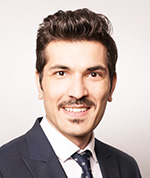DNA-Assembled Plasmonic Nanodevices
Date: 2021/11/23 – 2021/11/23
Academic Seminar: DNA-Assembled Plasmonic Nanodevices
Speaker: Dr. Fatih Nadi Gür, postdoctoral fellow, LMU Munich, Germany
Time: 3:00 p.m.-4:00 p.m., Nov 23rd, 2021 (Beijing Time)
Location: via Feishu
Abstract
One of the cornerstones in nanophotonics research is the miniaturization of optical devices to the nanometer scale. The realization of nanoscale optical devices with extremely high operation speeds could be enabled by DNA nanotechnology where DNA, the molecule of life, could be used as a molecular building block. Due to its biorecognition feature, DNA has been used successfully over the last decades as an engineering material for the bottom-up self-assembly of well-defined structures and devices on the nanoscale. In particular, DNA origami, in which a long single-stranded DNA (ssDNA) scaffold is self-assembled into 2D and 3D predefined shapes with a set of specifically designed short oligonucleotide staple-strands, allows building unprecedented complex and functional nanostructures with high yields. In this talk, plasmonic nanodevices, consisting of chemically synthesized monocrystalline metal nanoparticles, self-assembled by DNA are covered. These devices, including plasmonic waveguides, nanoantennas, and switches, can manipulate, localize and guide light without being diffraction-limited, enabling a path to leverage the high speed of photonics while retaining a subwavelength device footprint. With such nanoscale plasmonic devices, sub-micron mode confinement can be achieved with defined surface plasmon resonances at a particular frequency window. To characterize these devices with nanoscale resolution, advanced near/far-field optical spectroscopies were employed. These capabilities open up opportunities for a broad range of applications in nanoscale energy transfer, energy conversion, biosensors, and biomedicine.
Biography
 Fatih Nadi Gür received his bachelor of science degree in Physics from Izmir Institute of Technology, Turkey in 2010, master of science degree in Nanoscience and Nanotechnology with specialization in Biophysics from KU Leuven, Belgium in 2012, and Ph.D. degree in Physical Chemistry from the Center for Advancing Electronics Dresden, TU Dresden, Germany in 2018. Since 2019, he has been a postdoctoral fellow in the group of Prof. Dr. Tim Liedl, at the faculty of Physics in LMU Munich, Germany. His research interests lie in the field of DNA nanotechnology and Nano-Optics including DNA-assembled plasmonic nanostructures, dynamic DNA nanodevices, and their potential applications in biosensing, energy conversion, bioimaging, and nanoscale light/plasmon sources.
Fatih Nadi Gür received his bachelor of science degree in Physics from Izmir Institute of Technology, Turkey in 2010, master of science degree in Nanoscience and Nanotechnology with specialization in Biophysics from KU Leuven, Belgium in 2012, and Ph.D. degree in Physical Chemistry from the Center for Advancing Electronics Dresden, TU Dresden, Germany in 2018. Since 2019, he has been a postdoctoral fellow in the group of Prof. Dr. Tim Liedl, at the faculty of Physics in LMU Munich, Germany. His research interests lie in the field of DNA nanotechnology and Nano-Optics including DNA-assembled plasmonic nanostructures, dynamic DNA nanodevices, and their potential applications in biosensing, energy conversion, bioimaging, and nanoscale light/plasmon sources.
